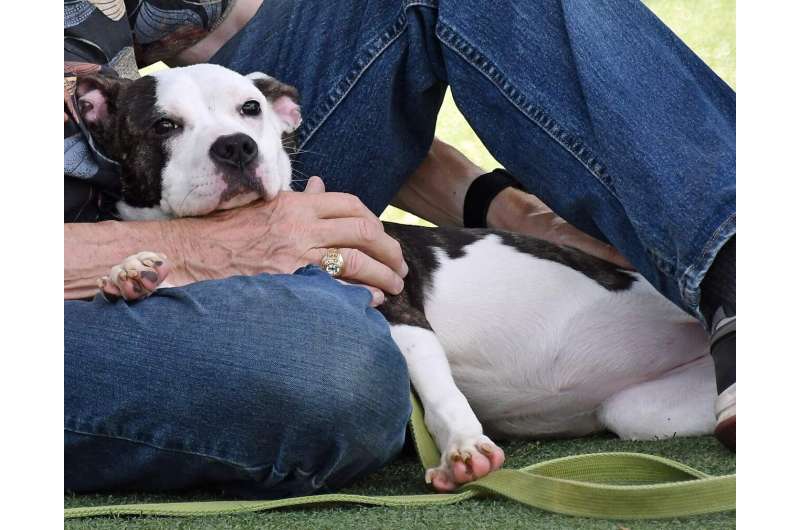This article has been reviewed according to Science X's editorial process and policies. Editors have highlighted the following attributes while ensuring the content's credibility:
fact-checked
peer-reviewed publication
trusted source
proofread
Owners of shelter dogs report high satisfaction with their new pet despite increases in problem behavior

Shelter dogs followed at their new homes for six months post-adoption were reported as showing more behaviors like stranger aggression or training problems by the end of the study—but owner satisfaction remained high, with 94% of owners reporting their dog's behavior as excellent or good, according to a study published August 16, 2023 in PLOS ONE by Kyle Bohland from the Ohio State University, US, and colleagues.
Although 2 million dogs are adopted from US shelters every year, very little research has been done on shelter dog behavior after placement into a home. Bohland and colleagues surveyed the owners of 99 dogs adopted from five Ohio shelters from October 2020 to May 2021, checking in with owners seven, 30, 90, and 180 days after adoption.
In each iteration of the survey, dog owners were asked about the following problem behaviors, scoring each behavior as demonstrated by their dog from 0–4: excitability, stranger-directed aggression, owner-directed aggression, dog-directed aggression, familiar dog aggression, stranger-directed fear, nonsocial fear, dog-directed fear, touch sensitivity, separation-related behavior, attachment and attention-seeking, training difficulty, chasing, and energy levels.
The initial survey asked about basic demographic information and whether the owner had owned a dog before. Each of the four surveys asked owners about overall satisfaction with their dog's behavior; any household changes since adoption; and if they still owned the dog.
Most notably, owners reported an increase from the initial survey in stranger-directed aggression behavior at every subsequent check-in, which went from being reported in 62% of dogs at 10 days to 77% of dogs at 180 days—possibly because as dogs became more comfortable in their household, their protective/territorial behaviors increased.
Over the six months of the study, owners also reported more excitability, touch sensitivity, training difficulty, and chasing behaviors as compared to baseline. Reports of separation-related behaviors and attachment and attention-seeking behaviors decreased, presumably as the dogs became assured their owners would consistently return home. In addition, seven people returned their adopted dog during the study period.
Despite the ratings suggesting increases in undesirable behavior like stranger aggression and training problems, in the final survey 100% of responding owners reported their dog adjusted to their new home extremely or moderately well; 94% rated their dog's overall behavior as excellent or good, six percent as fair, and no owner reported poor/terrible behavior. About 75% of owners said they thought their dog's behavior had improved over time.
Sampling bias is potentially present in the results, since participating dog owners opted into the study (with gift cards offered for completion of the first and final surveys). There may also be behaviors the survey did not capture, but which are strongly valued by owners and which might explain the high satisfaction ratings in the final survey.
The authors add, "This is one of the most comprehensive studies, using multiple time points, to investigate post-adoption behavior in dogs. The findings help shelters counsel new dog guardians with more accurate information on what behavior changes to expect after adoption. This information will hopefully allow people to get help sooner for their dog's behavior problems and keep more dogs in their adoptive homes."
More information: Bohland KR et al, Shelter dog behavior after adoption: Using the C-BARQ to track dog behavior changes through the first six months after adoption, PLoS ONE (2023). DOI: 10.1371/journal.pone.0289356. journals.plos.org/plosone/arti … journal.pone.0289356
Journal information: PLoS ONE
Provided by Public Library of Science



















